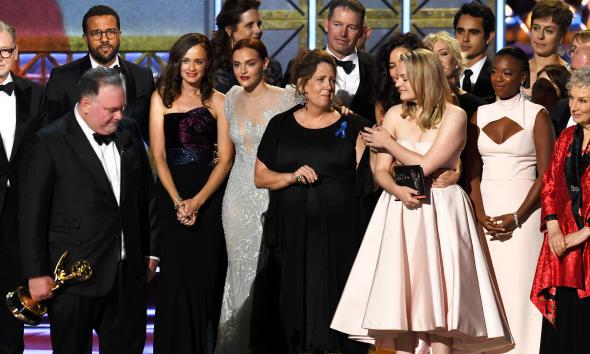The cast and creators of Hulu’s The Handmaid’s Tale may have Donald Trump to thank for their sweep of Emmy wins on Sunday night, but they didn’t mention him in any of their five acceptance speeches. Nor did they use their platform to make a statement about a woman’s right to control her own body, the issue that made the show so depressingly relevant this year.
It was a missed opportunity in a night that was otherwise pointedly political, seemingly the norm for awards shows nowadays.
Showrunner Bruce Miller came closest. In his acceptance speech for Outstanding Writing for a Drama Series, he said the award truly belonged to three (well-deserving) women, but failed to mention how the show might belong to women more generally. He ended the night—and his speech for the show’s Outstanding Drama win—by imploring the crowd, “Go home, get to work, we have a lot of things to fight for,” but what those things, or even who “we” were, remained unsaid. The show’s female award winners, actors Anne Dowd and Elisabeth Moss and director Reed Morano, failed to address the show’s disturbingly relevant themes at all.
Hulu’s adaptation of The Handmaid’s Tale was not envisioned as a contemporary political commentary. The latest rendering of Margaret Atwood’s 1985 dystopian novel was already in the works when Trump won the 2016 election. But his intervening victory fundamentally altered the climate in which the show premiered. Elisabeth Moss attracted criticism for being unwilling to call the show a feminist story at the Tribeca Film Festival, in comments she later walked back, and even Margaret Atwood has been reluctant to use the F word.
There’s no doubt that The Handmaid’s Tale became the cultural phenomenon it was thanks to President Trump. The hierarchical dystopia of Gilead, in which fertile women—“handmaids”— are forced to bear children for upper class couples, resonated with those horrified by the Trump administration’s attacks on civil liberties and the Republican party’s ongoing attempts to strip federal funding from Planned Parenthood, while the handmaid’s uniform became a suitably provocative costume for activists protesting legislative efforts to roll back their reproductive rights. It’s unlikely the show would have resonated so strongly or been so widely talked about in a United States presided over by Hillary Clinton, and it’s not hard to see The Handmaid’s Tale’s wins as, at least in part, a collective rebuke to Trump, whether the show’s cast was to acknowledge it or not.
The Handmaid’s Tale’s acceptance speeches could have been an important platform to drive home the show’s dark commentary. Other winners whose shows gained notoriety for their feminist themes were quick to use their speeches to reinforce them, in particular Nicole Kidman, who said that Big Little Lies had “shone a light on domestic abuse,” and that granting her the award “shines a light on it even more.” Continuing to downplay and even outright ignore the feminist significance of The Handmaid’s Tale is an insult to fans who flocked to, suffered through, and praised it for that very reason. As the Trump administration continues to spread fear and despair in the lives of women, the showrunners have now missed their most important opportunity to recognize their feminist support base and take up the mantle of women’s rights.
